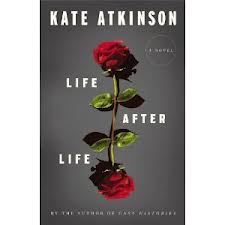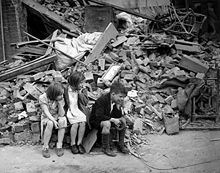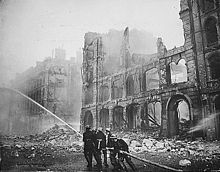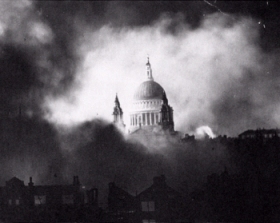It was suggested to Kate Atkinson, that the above might be a more apt title for her book, as the lives relived by the protagonist Ursula in Life After Life are many. In this book, the author has written something unlike anything that precedes it, a return perhaps to the kind of books she was writing before she started on her crime series featuring the fictional detective Jackson Brodie.
 Life After Life presents numerous versions of Ursula’s life story, a life whose course sometimes changes when her response to an event or an encounter is different to how she responded previously. It is not a conscious change, although she does possess a sense of déjà vu at times, however she is more propelled by instinct than any knowledge of having already lived, or perhaps she is responding to the ever strengthening morphic fields (see link below), that ability to tap into our own and the collective consciousness of remembered events, that link across time between the past and the present, which inevitably become stronger in someone who keeps returning, preparing them for future events.
Life After Life presents numerous versions of Ursula’s life story, a life whose course sometimes changes when her response to an event or an encounter is different to how she responded previously. It is not a conscious change, although she does possess a sense of déjà vu at times, however she is more propelled by instinct than any knowledge of having already lived, or perhaps she is responding to the ever strengthening morphic fields (see link below), that ability to tap into our own and the collective consciousness of remembered events, that link across time between the past and the present, which inevitably become stronger in someone who keeps returning, preparing them for future events.
The story begins (or does it end?) in 1930 before going back to her birth in February 1910. Her earliest lives pass quickly, birth at that time being as traumatic as, if not more difficult to survive than war. When the doctor can make it through the snowstorm and unwrap the umbilical cord from around her neck, she will have a better chance of surviving.
Ursula’s story for its many stops when darkness falls and restarts, takes place predominantly between 1910 and 1941 in England and Germany, with much of the narration taking place during the war, in particular the 57 consecutive nights of bombardment in London from September 1940, “the blitz”, when more than one million homes were destroyed and over 40,000 civilians killed with many more injured.
There are significant turning points in her adolescence connected with the lecherous friend of her brother and a passing stranger with insidious intent, otherwise she makes it to an independent life in London during the second world war in scenes that Atkinson brings alive in unimaginable ways, a city where nowhere is safe from the nightly bombs that will fall, their paths of destruction unpredictable, those who survive, forever changed by that traumatic experience.
 In the same way that one never knows which choices will lead to life and which to certain death as bombs rain down on London, so too as readers, do we turn each page with similar trepidation, never quite sure when darkness may fall again and our story begin over. Unpredictable, because subsequent experiences don’t necessarily guarantee a longer life, Life After Life has a simple structure, yet leaves the reader aware of the countless possibilities that could manifest.
In the same way that one never knows which choices will lead to life and which to certain death as bombs rain down on London, so too as readers, do we turn each page with similar trepidation, never quite sure when darkness may fall again and our story begin over. Unpredictable, because subsequent experiences don’t necessarily guarantee a longer life, Life After Life has a simple structure, yet leaves the reader aware of the countless possibilities that could manifest.
The BBC interviewer asked a question I had been pondering, suggesting that for a writer, there are numerous outcomes possible when plotting a story and in a sense this book is like stringing together several drafts, however Atkinson says that although you could consider it like that, it is not her method to write like that, it seems that she set out with this structure in mind, that she always knew how it was going to end, although I am unsure whether this story can ever end, you can see how it might go on forever.
 The appeal of the story for me is intricately tied to that structure and in fact I find it hard to think only about the story itself, which begs the question, which version of the story is the story? This is not a typical tale of transformation of a protagonist, while we recognise Ursula’s character in the many lives she lives, the story shows just how different our lives could become, based on even insignificant choices we make as well as the random events that can interrupt that path and change its course indelibly.
The appeal of the story for me is intricately tied to that structure and in fact I find it hard to think only about the story itself, which begs the question, which version of the story is the story? This is not a typical tale of transformation of a protagonist, while we recognise Ursula’s character in the many lives she lives, the story shows just how different our lives could become, based on even insignificant choices we make as well as the random events that can interrupt that path and change its course indelibly.
Life After Life is also a turning point for Kate Atkinson who says she won’t be writing another Jackson Brodie novel for a very long time, having felt some relief at being set free from the intricate plotting involved in crime writing and enjoyed getting back to just writing. She mentioned two possibilities for her next novel, either a companion novel to this one about Ursula’s younger brother Teddy, called A God in Ruins, or an homage to Agatha Christie, about a group of people stranded in a countryside hotel in a snowstorm during a murder mystery weekend called Death at the Side of the Rook.
It is clear that Kate Atkinson refuses to be bound by genre, labels or form, preferring freedom in her approach, she resists categorisation which makes her an exciting and unpredictable writer, even if she risks occasionally losing her readers as she embarks on a course to suit her own writerly desire and imagination and not the expectations of any particular audience. That I truly admire.
So let’s see how the judges of the Women’s Prize for Fiction 2013 respond, this title having just made the long list.
Additional Resources
Morphic Fields & Morphic Resonance – Rupert Sheldrake interviewed by Mark Leviton in The Sun Literature Magazine Feb 2013
Interview – Meet the Author – Nick Higham of the BBC speaks to Kate Atkinson.
Note: This book was an Advance Reader Copy (ARC) provided by the publisher via NetGalley.


Every book is different and I love the quote of Francis Bacon: Some books are to be tasted, others swallowed and some few to be chewed and digested. Which category does this book fall into?
LikeLike
It’s one to be chewed and digested definitely, I finished it weeks ago yet I’m still thinking about it and was fascinated to hear the author speak in that interview when I was in England this week, prompting me finally to scribble my own thoughts in my notebook while travelling.
LikeLike
As I do… while we grow fond of characters and wish to see them through all manner of experiences, there is a need to explore new ground and different lives. To do both it seems is a worthy experience for a writer, and she’s done it.
LikeLike
Wonderful review, Claire! I liked what you said about the book depicting how birth could be traumatic. It is difficult to believe that this is how it was not long time back. I also liked your comment that the book is a stringing together of several drafts. I haven’t read an Atkinson book yet, but your review makes me want to read this one. Which is your favourite Atkinson book? It is also interesting to know that Atkinson is thinking of writing a murder mystery novel as a homage to Agatha Christie. I hope she does that. I can’t wait to read it.
LikeLike
I did enjoy her first book Behind the Scenes at the Museum and I’ve read one of her crime novels for a light read, though it didn’t tempt me to continue with the others, this book is equally as good as her first I believe and could well be my favourite now that you ask the question, it has grown on me even more so since finishing it, sign of a good book perhaps.
LikeLike
Great review. I think I’ll love this book. I used to have my own theory on how small decisions in life might chance how it continues. So I’m really curious to see how exactly Atkinson makes it happen.
LikeLike
Thanks, it’s different, that’s for sure and it took me a while to react to it, for that very reason that you can’t just respond to the story. I look forward to reading what you think of it and your own theories on those small decisions and how they change the course of life.
LikeLike
I can’t wait to read this book – and your review has made me want to all the more!
LikeLike
I think this is one that will get everyone talking and not just about the story.
LikeLike
I recently discovered Kate Atkinson but have only read a couple of the Jackson Brodie books. I’ll definitely read this one, since it’s good to know that she defies categorisation. It would be very easy – and I’m sure agents and publishers prefer it – to stick with the tried and tested. Thanks for your insightful reviews.
LikeLike
I’ll be interested to read what you think coming to her from the crime novels, she has been literary and she has written some weird things in the past, never predictable, although we now know what she is considering next, somehow I think it will be the companion novel/sequel she opts for.
LikeLike
Pingback: Not the Orange Women’s Prize for Fiction Longlist | Word by Word
I admire authors who could transcend all genres and try something different. So good for Atkinson and I can’t wait to read this one and hope the queue at the library is not too long. I asked for it at Netgalley but they did not approved my request and doubt they would in time.
LikeLike
If they haven’t responded yet, they may still do so, it’s not published in the US until 2 April.
Yes her new-found freedom, now that she’s put Jackson Brodie on the shelf for the time-being is interesting, I wonder if it will be the sequel or the Agatha Christie homage, and whether making the shortlist or dare I say it, even winning the prize might influence her?
LikeLike
I believe Atkinson will continue to do what she wants to do. She has a very big following in the UK and I suspect the rest of the world too. She earns enough royalty to keep her going, winning the prize would be a plus but would be a must for young debut novelists. I keeping my hopes high for the Netgalley copy.
LikeLike
Kate Atkinson is one of those authors whose books I automatically pick up without even looking at the back. There was a review of this on Saturday Review last week, I can’t wait to read it.
LikeLike
I have this on my library list and as someone who is professionally interested in the way that narrative is organised I can’t wait to read it. If you’re interested there was another interview with her this afternoon (Sunday March 17th) on Radio 4’s Open Book. The programme is repeated at 3.30pm, this coming Thursday or you could catch it on the BBC I-Player.
LikeLike
Thanks for the tip, I will try and listen on my computer, I was fortunate to be in the UK last week to catch her on TV, it’s such a novelty to see and hear writers speak. I really look forward to your informed take on it. The way the narrative is organised is really original and I appreciated that she left some things unclear, it kept the reader asking questions, this reader is still pondering it!
LikeLike
Good review. I’ve heard about this book now from a couple of different people and it’s definitely percolating to the top of my to-read list. Thanks!
LikeLike
She is an interesting writer and this one kept me thinking for a long time after reading, I wasn’t sure how I could even write about it, until I heard her speak in that interview and suddenly it came to me what I thought, some novels need a good digestion period, this one definitely.
LikeLike
Another one for the wish list and another author I haven’t heard of. You always manage to thoroughly intrigue me with your beguiling words.
LikeLike
I read Atkinson’s debut when it first came out, and somehow it didn’t gel with me. Years later I should re-read, but this one does attract me and I got a copy the other day, and can’t wait now I’ve read your review.
LikeLike
Thanks Claire, this sounds really intriguing to me… Feels appropriate to put it on an airplane reading list for the next time I travel to the UK to visit family…
LikeLike
Great review! My interest in this one has been simmering for the past week or so, and you’ve certainly confirmed that this book and I will likely jive very well. I’ve never read any of the author’s other works, so I’m definitely looking forward to diving in.
LikeLike
Pingback: Women’s Prize for Fiction Shortlist & Pulitzer Prize 2013 | Word by Word
Pingback: Life After Life by Kate Atkinson | JoV's Book Pyramid
Pingback: A Hundred Thousand White Stones: An Ordinary Tibetan’s Extraordinary Journey | Word by Word
I wanted to read this book. Your review makes me want it even more! It seems really interesting
LikeLike
There are mixed feelings about it and I admit , it took me 2 weeks to write up my own thoughts. The story doesn’t really take off because it keeps restarting, but the structure adds a whole other dimension making the reader think about the implications. So, a clever book, that may perhaps not have been so popular had it had to rely upon plot alone.
LikeLike
Pingback: Baileys Women’s Prize for Fiction LongList 2016 #IWD2016 – Word by Word